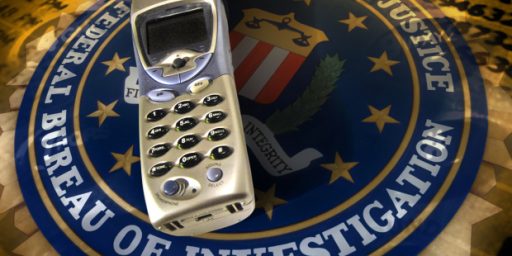Cheney and Wiretaps: Not Much to the WaPo Story
The following headline from WaPo contains no surprise (at least to me): Official: Cheney Urged Wiretaps. However, based on what is actually in the story, there really is no startling revelation about Cheney’s involvement:
Vice President Cheney told Justice Department officials that he disagreed with their objections to a secret surveillance program during a high-level White House meeting in March 2004, a former senior Justice official told senators yesterday.
That’s not exactly a startling bit of news.
Now, the following is perhaps tacky or even evidence that the Veep can be a bit vindictive, but I can’t imagine that it is unusual in Washington (or, for that matter, in business):
Comey said that Cheney’s office later blocked the promotion of a senior Justice Department lawyer, Patrick Philbin, because of his role in raising concerns about the surveillance.
And, to be fair, within an organization one never know for sure why one’s colleague was promoted or not, but there is often a strong sense as to why one guy did or did get promoted, fired, etc. It is rare that a clear and public reason is given.
Note: I have been critical of the wiretap program and the overall way that the administration has dealt with/used the DoJ. However, while the headline seems dramatic, there really isn’t much substance to this report.
Now, there may be more in Comey’s responses to written questions from the Senate (the source of the above information), but if so, the WaPo report doesn’t reveal it.




That one clip isn’t, but what happens after is important. Some DOJ officials told the Big Guy some bad news – what he wanted to do was illegal. That’s not a big story. But note that a)the very next day Gonzo and Card tried to strongarm Ashcroft into approving it anyway, and b) Cheney interfered in DOJ personnel practices to retributively quash a promotion & likely end the career of a guy who did what his job actually was – provide a legal assessment.
True, but Comey isn’t the public; he had much more intimate knowledge. And what Cheney did was possibly illegal; I don’t know enough about Philbin’s position or the applicability of labor laws on appointees, but if the DOJ had already decided to promote him, Cheney leaning in and stomping it is certainly eyebrow-raising.
Like so many things in this administration, the actions described might not be overtly illegal, but they clearly show a pattern of slime, pettiness, and putting personal motives above the rule of law & the good of the country.
As Legion perhaps suggests, the $64,000 question for Card and Gonzales now becomes: who suggested or directed that you pay Ashcroft a visit?
The story is mainly interesting for its implications for an answer to that question, and for its exemplifying the theory that there is no misdeed by this administration in which Cheney fails to play a part.
I agree that the visit to Ashcroft in the hospital is a big deal. However, there isn’t any new news on that subject in this piece, so I didn’t address it.
I previously wrote about the hospital visit here.